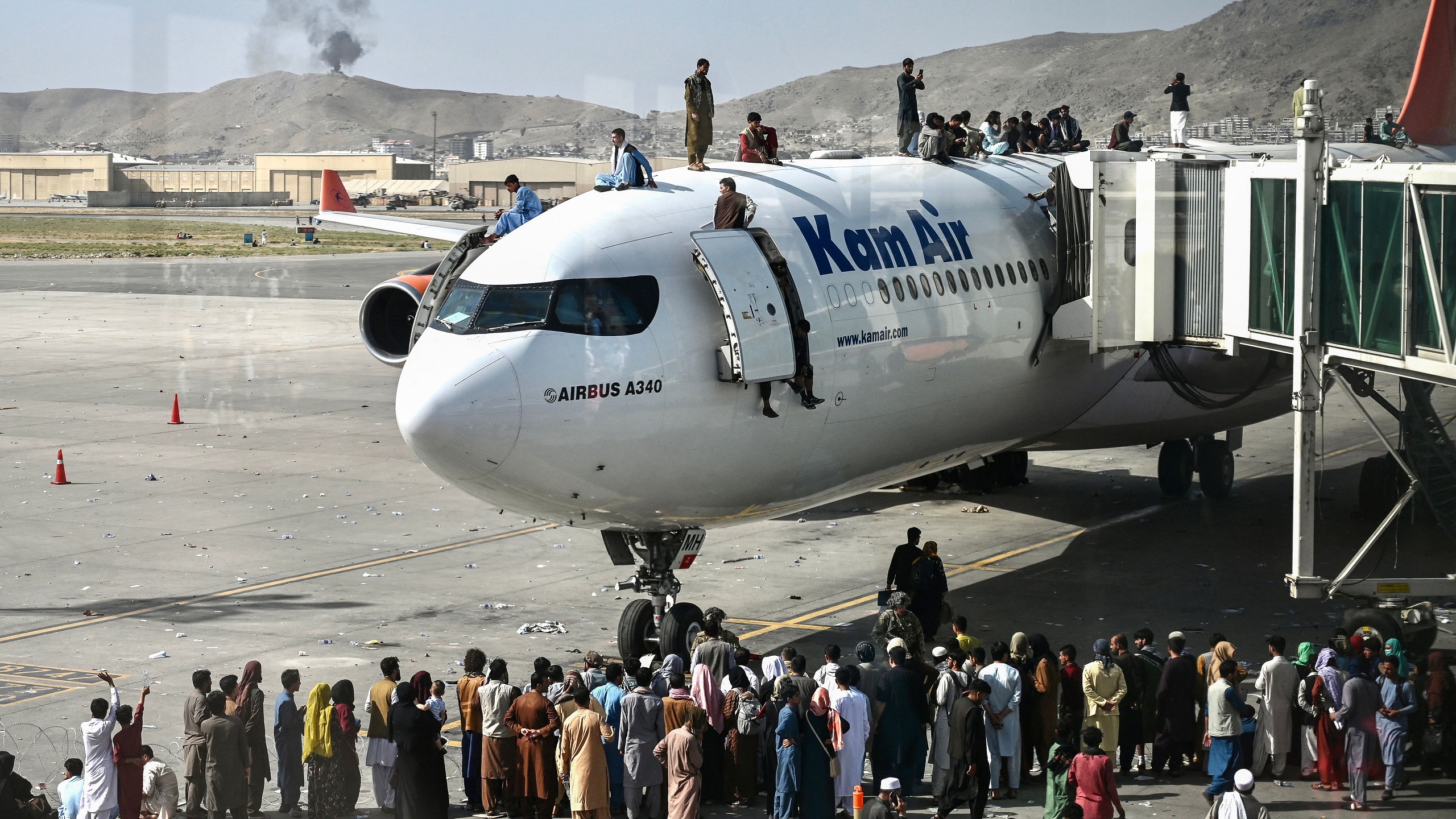Taliban Takeover of Afghanistan Comes 20 Years After US Invasion
Nearly 20 years after the United States invaded Afghanistan to remove the Taliban from power, the Taliban have overrun the capital, Kabul, and said they are making a “peaceful transfer of power,” as the US finished evacuating its embassy and lowered the American flag that flew over the building.
Afghan President Ashraf Ghani fled the country on Sunday, paving the way for the Taliban to enter the presidential palace, where its leaders reportedly were negotiating the transition of power with a group of high-level Afghan politicians.
On Monday, the Taliban declared the war in Afghanistan over and said it would soon present its new government, Al Jazeera reported.
“We have reached what we were seeking, which is the freedom of our country and the independence of our people,” Mohammad Naeem, a spokesman for the Taliban’s political office said. “We will not allow anyone to use our lands to target anyone, and we do not want to harm others.”
It is the first time that the Taliban have regained power since the United States and its allies overthrew them in December 2001 following the attacks on the World Trade Center in New York and the Pentagon outside of Washington, DC on Sept. 11, 2001. In the wake of the 9/11 attacks, the Taliban in Afghanistan refused to hand over the deadly attack’s mastermind, Osama bin Laden, head of the Islamist al-Qaida organization, leading to the US military intervention that toppled the Taliban.
By mid-2003, US President George W. Bush declared an end to major military activity in Afghanistan. Several months later, NATO assumed control of international security forces, or ISAF, in the country. A year later, in May 2005, Bush and Hamid Karzai, the first democratically elected president of Afghanistan, signed a strategic agreement to “strengthen US-Afghan ties and help ensure Afghanistan’s long-term security, democracy, and prosperity.” Under the agreement, Washington would “help organize, train, equip, and sustain Afghan security forces as Afghanistan develops the capacity to undertake this responsibility.”
In early 2009, US President Barack Obama committed thousands of additional troops to Afghanistan, for a total of about 37,000 troops in the war zone, while saying that the US would withdraw most combat forces from Iraq by the end of 2011. He later sent even more US troops to help train the Afghan army, for a total of over 100,000 US troops in Afghanistan by the end of that year. Obama also set July 2011 as the date for the start of a drawdown of US troops.
In May 2011, bin Laden was killed by US forces in Pakistan, and a month later, Obama announced the start of the US troop drawdown, with plans to withdraw all US troops by 2014, later extended to 2016. Meanwhile, NATO at the end of 2014 ended its combat operations in Afghanistan.
Ghani was elected president in September 2014, agreeing to a unity government with his chief opponent, Abdullah Abdullah; this, as the Taliban took control of parts of Afghanistan’s countryside, continuing their resurgence throughout 2015.
By mid-2017, US President Donald Trump announced that US troops would remain in Afghanistan to prevent the re-emergence of terrorists. The following year, the Trump administration cut off security assistance to Pakistan for its support of the Taliban. One year later, negotiations between the US and the Taliban continued in Doha.
In February, the Trump administration signed a preliminary peace agreement with the Taliban, in which the US agreed to reduce the number of troops in the country, and the Taliban agreed to refrain from using Afghanistan’s territory for terrorist activities. In November 2020, the Trump administration agreed to pull out half of US troops from the country by mid-January, right before Joe Biden took office, and committed the United States to pull all troops out by mid-2021, despite the fact that the ongoing negotiations between the Afghan government and the Taliban had not succeeded in arriving at an agreement.
In April, Biden acknowledged that all US troops would not be out of the country by the May cutoff and set a new deadline – the symbolic date of Sept. 11, 2021 – for all US troops to be removed from Afghanistan. The troop withdrawal, he said, would “end America’s longest war” and would take place regardless of whether progress was made in peace talks between the Taliban and the Afghan government. Biden had not spoken publicly of the takeover by late Sunday, though he had previously said that the withdrawal would continue despite Taliban advances.
As US troops began to leave in May, the Taliban started a new offensive in the north of the country, leading to the takeover of 26 of Afghanistan’s 34 provincial capitals in the last week, and to Taliban troops entering the capital, Kabul, on Sunday. Taliban fighters later on Sunday claimed that they were given the palace in a handover ceremony with government officials.
Afghan Interior Minister Abdul Sattar Mirzakwal said in a pre-recorded speech broadcast on Sunday that “the Afghan people should not worry. … There will be no attack on the city and there will be a peaceful transfer of power to the transitional government.”
Meanwhile, Afghan civilians from Sunday up until early Monday morning crowded into the airport at Kabul, attempting to get on any flight leaving the country. Scenes caught on camera showed the Afghans storming the tarmac and clambering up gangplanks leading to the airplanes. Later Monday morning, the Afghanistan Civil Aviation Authority announced the cancellation of all civilian flights out of the country.


